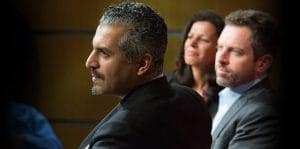
If we’re lucky, the arch of Sam Harris and Maajid Nawaz’s dialogue will end up being indicative of the broader public discourse. When the two first met, Maajid as a Muslim reformist and Harris as a trenchant atheist, a butting of antlers occurred. The two became ensnared in the struggle to dominate the other, made no progress, verging on an old-fashioned parking lot tussle. In other words, the exchange was not dissimilar to the circus that one expects when tuning into a cable news program or a presidential debate—all sound and fury, signifying nothing.
However, when they met again—this time in good faith—their exchange of ideas did not resemble the “can’t look away” car crash one usually expects, particularly with a topic like religion, but instead, two carefully formed, yet still malleable objects colliding and leaving an impression on one another. The aim of their discussion wasn’t to fire their opinions from afar, turn around, close their eyes, and plug their ears, like Wyle E. Coyote setting off a rocket, but to listen, learn, and adapt. As Harris puts it, “I don’t want to be wrong longer than I need to be.”
Islam & the Future of Tolerance, a documentary from Jay Shapiro and Desh Amila, uses Harris and Nawaz’s relationship as a foundation from which to unpack and organize the stigma of discussing Islam. Such a discussion has become increasingly difficult, partly due to the conflation of the religion and the people who practice the religion. This conflation, much to the surprise of Harris and Nawaz—and plenty of others—generally comes from the political left, who have, in the past, been the champion of liberal ideas, such as free speech, which includes the freedom to criticize religions. At the end of the day, a religion is merely an idea, and all ideas are subject to scrutiny. Only by scrutinizing ideas can we separate the good from the bad, and, as Nawaz explains in the film, groups like ISIS and the KKK are the result of bad ideas—bad ideas are not the result of ISIS and the KKK, though they’re certainly repackaged and redistributed.

“…uses Harris and Nawaz’s relationship as a foundation from which to unpack and organize the stigma of discussing Islam.”
Perhaps, the most notorious clash between traditional liberalism and what Nawaz refers to as “regressive” liberalism occurred on Real Time with Bill Maher in 2014. Harris was on the show discussing the oppression and extremism that has run rampant in the Muslim world, going so far as to describe Islam as the “motherload of bad ideas.” Maher’s guest, Ben Affleck responded by calling Harris’ words “gross” and “racist.” By that second adjective, we can ascertain that Affleck has trouble separating ideas from people, because condemning ideas—which religion is a leather-bound version of—is very different from condemning a race of people. What Affleck was likely confused by was the fact there are legitimate bigots and xenophobes out there who despise both the ideas and the people, and Harris’ more nuanced view threw Affleck off. For those who share Affleck’s feelings, it’s as if there are only two groups at play: the extreme left—which represents all that is tolerant and virtuous—and the extreme right—which represents all that is hateful and ignorant. Anyone who is caught on the other side of the median, even if it’s just an inch, is immediately regarded by a poor depth of field, as being an extremist and an enemy. And it’s impossible to have a fruitful discussion with someone you regard—or who regards you—as an enemy.
Considering that these concepts are complex and require great care in their delivery, Shapiro and Amila do an excellent job as handlers, creating a narrative structure that’s logical and providing further texture to the ideas themselves. One of the more useful aspects of the film is its visualization of the concentric circles of Islam and the vital differences between Jihadism, Islamism, and conservative Islam, all of which are often used synonymously. Also fascinating are the areas where Harris and Nawaz continue to disagree, despite their common ground on Muslim reformation, such as whether or not religious text is meant to be read literally or is to be interpreted. Harris makes a flimsy analogy to the general expectation that a restaurant menu tells it like it is, while even Nawaz admits that certain passages require intellectual gymnastics to satisfy our modern ethics.

“…its broader message is the championing of grown-up conversations.“
While the titular religion is the focus of Islam & the Future of Tolerance, its broader message is the championing of grown-up conversations. Marrying ourselves to the first ideology that knocks on the door with a bouquet of roses is no way to win friends and influence people, because every disagreement that arises thereon will assume a confrontational mien, forcing you into a defensive position, which is conducive to nothing. Careful use of language is also important in having successful discussions, not for the risk of offending, but for precision’s sake.
For these reasons and more, the film serves as a rewarding introductory course to the school of thought that Sam Harris and Maajid Nawaz are a part of. It’s a school that views smart people having uncomfortable conversations as not only a vital component to any thriving society but the only way to solve our most deeply rooted problems. Otherwise, society will just become more polarized, and everyone will scurry off into their respective corners, where they’ll hiss at each other, much to the delight of their fellow corner-dwellers. But feel free to disagree, of course.

Islam & the Future of Tolerance (2018) Directed by Jay Shapiro and Desh Amila. Starring Maajid Nawaz, Sam Harris, Ayaan Hirsi Ali, Douglas Murray, Adam Deen, Yasmine Mohammed, Haras Rafiq, Ali A. Rizvi, Faisal Saeed Al Mutar.
8 out of 10 stars

